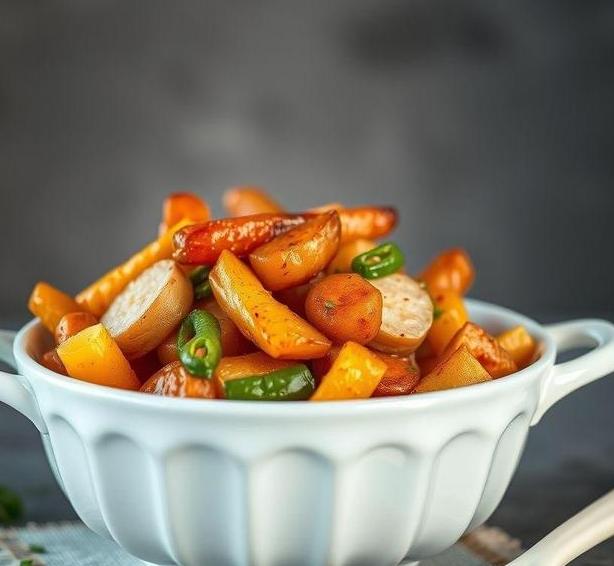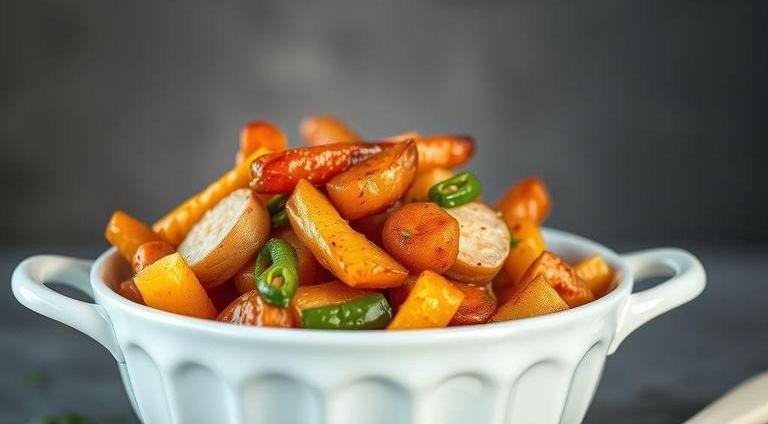When we cook meals, there’s often a sense of accomplishment and satisfaction that comes with it. The aroma of fresh food, the beauty of a well-prepared dish-it’s a pleasure that’s hard to beat. But, what happens after that meal is done? How long can those leftovers sit in the fridge before they start to lose their quality or even turn dangerous?
The shelf life of cooked food is something many of us overlook until it’s too late. Understanding how long cooked food stays safe to eat, and what steps you can take to store it properly, is essential not only to ensure food safety but also to preserve its flavor and nutritional value. Let’s dive deep into the details of cooked food, its potential for spoilage, and how to handle leftovers like a pro.
Can Cooked Food Go Bad?
Yes, cooked food can absolutely go bad, and sometimes faster than we think! While cooking food kills many harmful bacteria, it doesn’t guarantee that the food will stay safe indefinitely. Once food is cooked, it enters the "danger zone," where bacteria can multiply quickly-especially if it’s not stored properly.
- The Danger Zone: The USDA defines the temperature danger zone as between 40°F (4°C) and 140°F (60°C). This is the range in which bacteria such as Salmonella, E. coli, and Listeria thrive and multiply most rapidly. Leaving cooked food out at room temperature for too long-say more than two hours-can allow these harmful bacteria to multiply and potentially make you sick.
- What Causes Food to Spoil? Spoilage occurs when bacteria, mold, or yeast start to break down the food. While not all types of spoilage are dangerous (some just affect taste, smell, or texture), certain types can lead to foodborne illnesses. A good rule of thumb is: when in doubt, throw it out. It’s better to be safe than sorry.
Shelf Life For Cooked Food

The shelf life of cooked food can vary widely depending on the type of food, how it’s stored, and the conditions under which it’s kept. But, to give you a more concrete idea, here are some general guidelines for the most common cooked foods:
-
Cooked Meat And Poultry
- In the fridge: 3-4 days
- In the freezer: 2-6 months (varies depending on the type of meat)
- Chicken, beef, pork, lamb, and fish all fall into this category, but remember that their shelf life can be affected by the cooking method. For instance, fried chicken will spoil a little faster than roasted or grilled chicken because of the oil content.
-
Cooked Rice And Pasta
- In the fridge: 3-5 days
- In the freezer: 1-2 months
- Both of these are prone to bacterial growth (particularly Bacillus cereus, which can cause food poisoning). Be sure to refrigerate them promptly to avoid issues.
-
Cooked Vegetables
- In the fridge: 3-7 days
- In the freezer: 10-12 months
- The shelf life of vegetables depends on how they were cooked (boiled, steamed, or roasted). Remember, foods like potatoes and cooked greens tend to spoil faster than others due to their moisture content.
-
Soups And Stews
- In the fridge: 3-4 days
- In the freezer: 2-3 months
- These are often perfect for freezing because the ingredients tend to hold up well. But do keep an eye out for any signs of mold or sourness if you plan on storing them for several days.
-
Cooked Eggs
- In the fridge: 1 week
- In the freezer: Not recommended
- Cooked eggs, like scrambled or boiled eggs, have a relatively short lifespan. After one week, they should be eaten or tossed.
Common Signs Of Spoilage
It’s important to keep your senses sharp when it comes to detecting food spoilage. Here are some key signs that your cooked food may have gone bad:
- Smell: This is usually the first indicator of spoilage. A sour, rancid, or off smell is a clear warning sign. Trust your nose-if it smells bad, it’s probably bad.
- Texture: A change in texture, such as sliminess or a mushy consistency, can be an indication that bacteria or mold is growing. For example, leftover rice that becomes sticky and overly soft may be showing signs of bacterial growth.
- Color Changes: If your food begins to discolor, it’s a bad sign. Cooked meats may develop a greenish or grayish hue, while vegetables can turn an unappealing shade of brown or black.
- Mold: If you spot any fuzzy, white, or colored growth on the surface of your food, toss it out. Mold loves to grow on food, particularly when moisture is involved.
- Taste: If you’re unsure whether a food is spoiled, tasting a small amount can help. A sour or off taste, or anything that’s unpleasant, means it’s no longer safe to eat.
How To Store Cooked Food?

Proper storage is crucial to keeping cooked food safe and fresh for as long as possible. If done right, you can significantly extend the lifespan of your leftovers. Here’s how:
-
Cool Food Quickly
- After cooking, don’t leave food out for too long. Ideally, you should refrigerate or freeze it within two hours (or one hour if the room temperature is above 90°F).
- To cool food quickly, you can divide large portions into smaller containers, or place a pot in an ice bath to reduce its temperature faster.
-
Use Airtight Containers
- Store cooked food in airtight containers or tightly wrap them with plastic wrap or aluminum foil to prevent exposure to air, which can promote bacterial growth. Glass containers with secure lids are especially great at keeping food fresh.
-
Label And Date
- Always label your containers with the date they were cooked. This makes it easier to track how long they’ve been stored and helps avoid confusion later on. Stickers or masking tape and a marker do the job.
-
Freezing For Longer Storage
- If you plan on keeping food for an extended period, freezing is your best bet. Be sure to freeze food in freezer-safe containers or bags to avoid freezer burn. Make sure to remove as much air as possible.
-
Avoid Refreezing
- Once food has been defrosted, it’s not safe to freeze it again. The process of thawing and refreezing can increase the likelihood of bacterial growth, so plan your meals carefully to avoid this issue.
Expert Tips
-
Don’t Overload Your Fridge
- Storing too much food in the fridge at once can reduce airflow and make it harder for the fridge to maintain a consistent, safe temperature. Keep the fridge organized and leave room for air to circulate around each container.
-
Freeze Soups And Sauces In Portions
- If you have large amounts of soup or sauce, consider freezing them in ice cube trays. Once frozen, transfer the cubes into a freezer bag. This way, you can pull out individual portions when needed, without having to thaw the entire batch.
-
Be Cautious With Leftovers
- If you’re not sure if a leftover dish is still good, it’s safer to toss it than risk getting sick. It’s always better to eat freshly cooked food.
-
Use Your Senses
- Relying on your sense of smell, sight, and taste is essential when determining the safety of cooked food. It’s always worth checking before diving into that leftover casserole.
FAQs
How Long Does Cooked Food Last In The Refrigerator?
Cooked food can typically last 3 to 4 days in the refrigerator. However, the exact shelf life depends on the type of food, the way it was stored, and the temperature of the fridge.
How Can I Tell If Cooked Food Has Gone Bad?
Signs that cooked food has gone bad include an off smell, unusual texture, or a change in color. If the food looks or smells strange, it’s best to discard it. Additionally, mold or sliminess can indicate spoilage.
Can Cooked Food Spoil Even If Stored In The Fridge?
Yes, even in the fridge, cooked food can spoil. If it’s not stored in airtight containers, or if the fridge temperature is above 40°F (4°C), bacteria can still grow and cause food to go bad.
Is It Safe To Eat Leftover Cooked Food After A Week?
It is generally not safe to eat cooked food left in the fridge for more than 7 days. After a week, bacteria may have multiplied to dangerous levels, increasing the risk of foodborne illness.
Can Cooked Food Go Bad If Left Out For Too Long?
Yes, cooked food can go bad if left out at room temperature for more than 2 hours. Bacteria multiply rapidly between 40°F (4°C) and 140°F (60°C), so food should be refrigerated or frozen promptly.
Can Cooked Food Be Reheated After It Has Been Refrigerated?
Yes, cooked food can generally be reheated after being refrigerated. However, it should be heated to an internal temperature of 165°F (74°C) to ensure it is safe to eat.
What Is The Best Way To Store Cooked Food To Prevent Spoilage?
To prevent spoilage, store cooked food in airtight containers and refrigerate it within two hours of cooking. Ensure your fridge is set to 40°F (4°C) or lower. For long-term storage, freezing is an effective option.
Can Cooked Food Go Bad In The Freezer?
While freezing slows down the growth of bacteria, cooked food can still go bad if it’s not properly wrapped or stored. Freezer burn, which affects the texture and flavor, can also cause the food to become inedible over time.
How Do I Know If Cooked Food Is Still Safe To Eat After Freezing?
Cooked food remains safe indefinitely in the freezer if kept at 0°F (-18°C) or lower. However, its quality may decrease over time. If the food looks discolored, freezer-burned, or has a strange odor after thawing, it may not be good to eat.
Can Spices Or Seasonings Affect The Shelf Life Of Cooked Food?
Spices and seasonings generally do not affect the shelf life of cooked food significantly, but acidic ingredients like vinegar or citrus can help preserve certain foods, potentially extending their freshness.